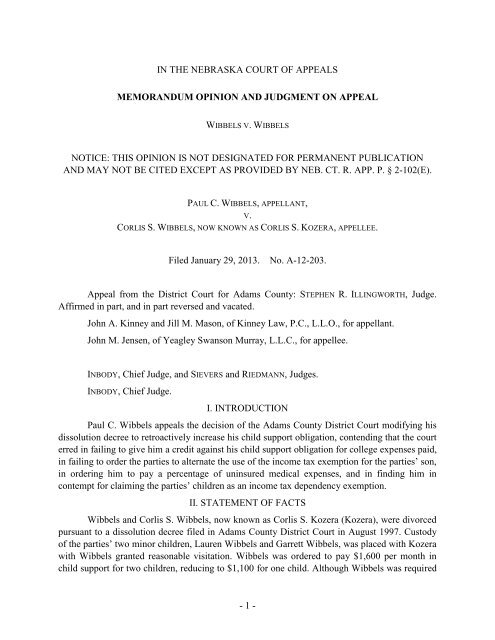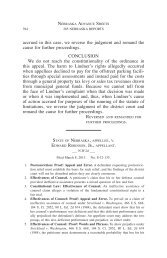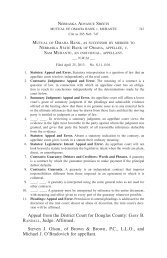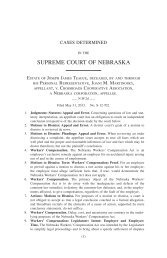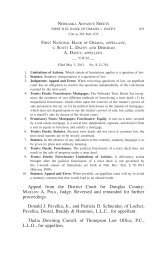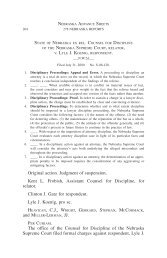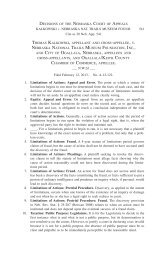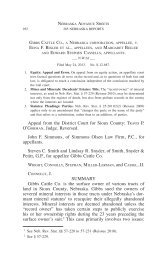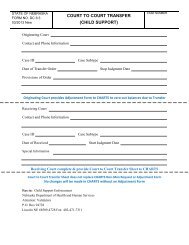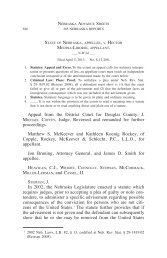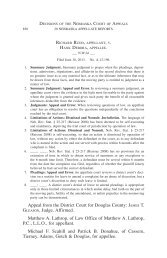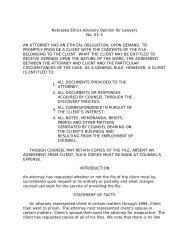Wibbels v. Wibbels - Nebraska Judicial Branch
Wibbels v. Wibbels - Nebraska Judicial Branch
Wibbels v. Wibbels - Nebraska Judicial Branch
Create successful ePaper yourself
Turn your PDF publications into a flip-book with our unique Google optimized e-Paper software.
IN THE NEBRASKA COURT OF APPEALS<br />
MEMORANDUM OPINION AND JUDGMENT ON APPEAL<br />
WIBBELS V. WIBBELS<br />
NOTICE: THIS OPINION IS NOT DESIGNATED FOR PERMANENT PUBLICATION<br />
AND MAY NOT BE CITED EXCEPT AS PROVIDED BY NEB. CT. R. APP. P. § 2-102(E).<br />
PAUL C. WIBBELS, APPELLANT,<br />
V.<br />
CORLIS S. WIBBELS, NOW KNOWN AS CORLIS S. KOZERA, APPELLEE.<br />
Filed January 29, 2013.<br />
No. A-12-203.<br />
Appeal from the District Court for Adams County: STEPHEN R. ILLINGWORTH, Judge.<br />
Affirmed in part, and in part reversed and vacated.<br />
John A. Kinney and Jill M. Mason, of Kinney Law, P.C., L.L.O., for appellant.<br />
John M. Jensen, of Yeagley Swanson Murray, L.L.C., for appellee.<br />
INBODY, Chief Judge, and SIEVERS and RIEDMANN, Judges.<br />
INBODY, Chief Judge.<br />
I. INTRODUCTION<br />
Paul C. <strong>Wibbels</strong> appeals the decision of the Adams County District Court modifying his<br />
dissolution decree to retroactively increase his child support obligation, contending that the court<br />
erred in failing to give him a credit against his child support obligation for college expenses paid,<br />
in failing to order the parties to alternate the use of the income tax exemption for the parties’ son,<br />
in ordering him to pay a percentage of uninsured medical expenses, and in finding him in<br />
contempt for claiming the parties’ children as an income tax dependency exemption.<br />
II. STATEMENT OF FACTS<br />
<strong>Wibbels</strong> and Corlis S. <strong>Wibbels</strong>, now known as Corlis S. Kozera (Kozera), were divorced<br />
pursuant to a dissolution decree filed in Adams County District Court in August 1997. Custody<br />
of the parties’ two minor children, Lauren <strong>Wibbels</strong> and Garrett <strong>Wibbels</strong>, was placed with Kozera<br />
with <strong>Wibbels</strong> granted reasonable visitation. <strong>Wibbels</strong> was ordered to pay $1,600 per month in<br />
child support for two children, reducing to $1,100 for one child. Although <strong>Wibbels</strong> was required<br />
- 1 -
y the decree to provide medical coverage for the children and to pay 85 percent of work-related<br />
daycare expenses, the decree did not include any provisions for uninsured medical expenses, nor<br />
did it address the issue of income tax dependency exemptions for the parties’ minor children.<br />
The decree also provided that <strong>Wibbels</strong> “shall pay the reasonable and necessary expenses<br />
associated with the children obtaining quality college educations.”<br />
In June 2010, Kozera filed a complaint to modify the decree, requesting an increase in<br />
child support and that <strong>Wibbels</strong> be ordered to pay a portion of the minor children’s uninsured<br />
medical expenses. <strong>Wibbels</strong> filed an answer and counterclaim requesting a reduction in his child<br />
support obligation to account for his subsequently born children, requesting that he be awarded<br />
specific parenting time, and requesting that the decree be modified to address the award of<br />
income tax dependency exemptions.<br />
In April 2011, Kozera filed a motion for an order to show cause why <strong>Wibbels</strong> should not<br />
be held in contempt for claiming both of the parties’ children on his 2010 income tax return<br />
despite having knowledge that he was not entitled to claim either of the children for income tax<br />
dependency purposes. The contempt hearing was held on June 7, and the hearing on the<br />
complaint for modification was held on August 18.<br />
1. FINANCIAL CIRCUMSTANCES OF PARTIES<br />
AND LAUREN’S COLLEGE EXPENSES<br />
<strong>Wibbels</strong> is a physician practicing with Hastings Internal Medicine, P.C., earning a gross<br />
income of approximately $713,000 per year. He is also involved in Hastings Internal Medicine<br />
Building Co., LLC; Hastings Surgical Center, LLC; and Imaging Center of Hastings, LLC.<br />
<strong>Wibbels</strong> has remarried, and he and his wife have three minor children.<br />
In addition to his medical practice, <strong>Wibbels</strong> invested in an Angus cattle operation, but<br />
due to a genetic defect in the cattle herd, he sustained over $2 million in losses on that<br />
investment. <strong>Wibbels</strong> and his wife signed personal guaranties related to the cattle operation, and<br />
according to <strong>Wibbels</strong>’ testimony, the loans still totaled over $2.4 million, equating to debt<br />
obligations of about $295,000 annually. Additionally, <strong>Wibbels</strong> testified that he has lump-sum<br />
payments related to the debt due in 2014, that are “well over $700,000.” <strong>Wibbels</strong>’ 2010 tax<br />
return showed agricultural losses of $961,676.<br />
Kozera is employed at a clinic in Kearney, earning approximately $58,000 per year. She<br />
has also remarried, and she and her husband have two minor children together. At the time that<br />
Kozera filed the complaint to modify in June 2010, the parties’ oldest child, Lauren, was still a<br />
minor; however, at the time of the hearing in August 2011, Lauren had turned 19. Lauren began<br />
attending college in August 2010, and she turned 19 in March 2011.<br />
Since August 2010, Lauren has not been living in Kozera’s home. During her first<br />
semester of college, Lauren came home about four times, and during her second semester, she<br />
came home about the same amount, perhaps slightly more frequently. Kozera testified that<br />
although Lauren has been attending college since August 2010, she has continued to provide<br />
financial support to Lauren for things such as Lauren’s cellular telephone, car insurance, car<br />
repairs, gas money, uninsured medical expenses, clothes, food, and dormitory room items.<br />
From August 2010 to March 2011, in addition to paying child support for Lauren while<br />
she was attending college, <strong>Wibbels</strong> has paid more than $20,000 in tuition, books, and room and<br />
- 2 -
oard for Lauren to attend college prior to her reaching the age of 19. <strong>Wibbels</strong> testified that he<br />
was requesting a dollar-for-dollar credit to his child support obligation related to Lauren for<br />
paying college tuition and room and board for a child who is under the age of 19 and attending<br />
college. <strong>Wibbels</strong> also testified that he paid $2,000, which was half the cost of Lauren’s car.<br />
2. INCOME TAX DEPENDENCY EXEMPTIONS<br />
The parties acknowledge that the initial dissolution decree did not address the issue of the<br />
income tax dependency exemptions, and the parties likewise acknowledge that <strong>Wibbels</strong> has<br />
claimed the parties’ two children as income tax dependency exemptions every year since 1997.<br />
Kozera testified that the first year, <strong>Wibbels</strong> “bullied” her into giving up the dependency<br />
exemptions, and that she had not pursued the issue since that time until 2011, when she learned<br />
that, as custodial parent, she was entitled to claim the parties’ children for tax purposes since the<br />
dissolution decree did not provide who was to claim the dependency exemptions. She provided<br />
<strong>Wibbels</strong> with notice that he was not allowed to claim the parties’ children for the 2010 tax year<br />
via letter dated February 17, 2011. Thereafter, <strong>Wibbels</strong> filed a motion with the court to allow<br />
him to claim one of the dependency exemptions and the matter was set for hearing in April, but<br />
no determination was made regarding the issue because <strong>Wibbels</strong> withdrew his motion. Shortly<br />
thereafter, Kozera filed her 2010 tax return and then received notification that the Internal<br />
Revenue Service had rejected her return because <strong>Wibbels</strong> had already filed, claiming the parties’<br />
two children as dependents. Kozera testified that she was required to file an extension to have<br />
her tax forms reprepared and refiled, and in the preparation of the amended return, she learned<br />
that she would receive $5,561 less of a refund without claiming Lauren and Garrett.<br />
<strong>Wibbels</strong> denied knowing that he did not have the authority to claim the children for<br />
dependency exemptions, testifying that he consulted his attorney and accountant for advice.<br />
When asked by Kozera’s attorney, “You were also informed that you could not, were not,<br />
entitled or not authorized by . . . Kozera to claim the dependency exemptions with respect to the<br />
children for 2010, weren’t you?” <strong>Wibbels</strong> replied, “I was not informed of that, no. I took the<br />
advice of my attorney and the advice of my accountant that I’ve had for several years. I listened<br />
to the wise people that are in my life and I used counsel and did the right thing.” <strong>Wibbels</strong> further<br />
stated that there was never any controversy over him claiming the exemptions and that there was<br />
never any bullying on his part with respect to the dependency exemptions. <strong>Wibbels</strong> proposed that<br />
the parties alternate the dependency exemptions for their children. Kozera also testified that at a<br />
minimum, she would like to receive the exemption for Garrett on an alternating basis.<br />
3. GARRETT’S MEDICAL ISSUES<br />
Kozera testified that Garrett has a medical diagnosis of Asperger’s syndrome, which is on<br />
the autism spectrum. Garrett is highly functional, is in a regular classroom at his school,<br />
performs well academically, but does have an individual education plan at school. Garrett has<br />
issues socially and with coordination, and when faced with a new situation, Garrett “just kind of<br />
shuts down.” According to Kozera, Garrett does not feel comfortable interacting socially with<br />
peers or with people with whom he is unfamiliar.<br />
Every year, Kozera takes Garrett to see a doctor in Chicago. This appointment costs<br />
between $700 and $1,000, and the travel expenses associated with the appointment cost another<br />
- 3 -
$1,000, none of which is covered by insurance. According to Kozera, at the doctor’s visit, after<br />
taking information and urine, blood, and hair samples from Garrett, the doctor prescribes<br />
compounded vitamins and minerals for Garrett which cost approximately $250 to $300 per<br />
month. Kozera testified that she has observed a huge improvement in Garrett’s behavior since<br />
undergoing this treatment. According to Kozera, she has used funds from her tax refund to pay<br />
for these expenses because <strong>Wibbels</strong> has not paid for uninsured medical expenses for their<br />
children. <strong>Wibbels</strong> did not acknowledge that Garrett had Asperger’s syndrome, only that he has<br />
some social skills issues.<br />
4. DISTRICT COURT ORDER<br />
In December 2011, the district court entered an order setting <strong>Wibbels</strong>’ monthly child<br />
support at $3,445, which calculation took into account the subsequent children of the parties. The<br />
court rejected <strong>Wibbels</strong>’ argument that application of the guidelines would be unjust or<br />
inappropriate because of the amount of debt that <strong>Wibbels</strong> serviced yearly and the college<br />
expenses that he pays for Lauren, and will be paying for the subsequent children he supports.<br />
The court noted that in 2009 and 2010, <strong>Wibbels</strong> received tax refunds of $166,959 and $217,118,<br />
respectively, and that those refunds were a result of his losses in the cattle business and would<br />
“go a long way in servicing the debt.” Thus, after considering the aforementioned factors, the<br />
district court determined that <strong>Wibbels</strong>’ monthly child support obligation of $3,445 was fair and<br />
equitable.<br />
Further, the district court found that although Kozera requested that <strong>Wibbels</strong>’ increased<br />
child support obligation be retroactive to July 1, 2010, which was the first of the month after she<br />
filed the complaint to modify, the more equitable date to retroactively order support was April 2,<br />
2011, because that was the first of the month after which Lauren emancipated and <strong>Wibbels</strong> had<br />
paid approximately $20,000 for Lauren’s college expenses during the 2010-11 school year. Thus,<br />
the court ordered <strong>Wibbels</strong>’ new child support obligation retroactive to April 2, 2011.<br />
Additionally, the court ordered that effective with the 2011 and subsequent tax years,<br />
<strong>Wibbels</strong> was allowed to claim Lauren as an exemption pursuant to Department of Treasury<br />
Publication 501, and that Kozera shall receive the exemption for Garrett as the custodial parent<br />
for 2011 and subsequent years.<br />
With regard to the contempt action, the district court made the following factual findings:<br />
that Kozera had allowed <strong>Wibbels</strong> to take the tax exemptions from 1997 until 2009; however, in<br />
2010, when she discovered that as custodial parent, she could take the exemptions, she notified<br />
<strong>Wibbels</strong> by letter dated February 17, 2011, that he was no longer authorized to claim the parties’<br />
children as dependents for income tax purposes. Kozera filed her 2010 tax return claiming the<br />
minor children as dependents, but her tax return was rejected because <strong>Wibbels</strong> had previously<br />
filed his 2010 tax return claiming the parties’ children as dependents. The rejection of Kozera’s<br />
tax return cost her $5,561 in refunds. The court found that in February 2011, <strong>Wibbels</strong> was put on<br />
notice via letter that he was no longer authorized to claim the parties’ children as dependents for<br />
income tax purposes, that <strong>Wibbels</strong> signed his 2010 tax return on March 29, 2011, and that<br />
<strong>Wibbels</strong> had filed a request for the court to address the 2010 income tax return but later<br />
withdrew that request on April 14, 2011. Based on these facts and citing the “clear rule” that<br />
absent an agreement between the parties or a court order, the custodial parent gets the exemption,<br />
- 4 -
the court found <strong>Wibbels</strong> in contempt because he was put on notice before filing his return and<br />
held that <strong>Wibbels</strong> could purge his contempt by paying $5,561 to Kozera. The court “entered<br />
judgment” in that amount. This amount was reduced by $1,500 in an order following a motion<br />
for new trial/motion to alter or amend judgment filed by <strong>Wibbels</strong> to reflect the fact that Kozera<br />
claimed an education credit on her tax return summary to which she would not be entitled, which<br />
entry resulted in an overestimation of her estimated tax refund. Thus, the reduced amount of the<br />
judgment was $4,061. Also included in the order on <strong>Wibbels</strong>’ motion for new trial was a<br />
provision that <strong>Wibbels</strong> was responsible for 92 percent of uninsured medical expenses for the<br />
parties’ minor child(ren) after Kozera had paid the first $480 per child per year.<br />
III. ASSIGNMENTS OF ERROR<br />
<strong>Wibbels</strong> contends that the district court erred in finding him in contempt of court for<br />
claiming the parties’ children as an income tax dependency exemption. He contends that the<br />
district court erred in its modification of the dissolution decree by (a) failing to give him a credit<br />
against his child support obligation for college expenses paid; (b) increasing his monthly child<br />
support obligation to $3,445; (c) ordering the increase in child support retroactive to April 1,<br />
2011; (d) failing to order the parties to alternate the use of the income tax exemption for Garrett;<br />
and (e) ordering him to pay a percentage of uninsured medical expenses.<br />
IV. ANALYSIS<br />
1. CONTEMPT<br />
<strong>Wibbels</strong> contends that the district court erred in finding him in contempt of court for<br />
claiming the parties’ children as income tax dependency exemptions.<br />
In a civil contempt proceeding where a party seeks remedial relief for an alleged violation<br />
of a court order, an appellate court employs a three-part standard of review in which (1) the trial<br />
court’s resolution of issues of law is reviewed de novo, (2) the trial court’s factual findings are<br />
reviewed for clear error, and (3) the trial court’s determinations of whether a party is in contempt<br />
and of the sanction to be imposed is reviewed for abuse of discretion. Spady v. Spady, 284 Neb.<br />
885, ___ N.W.2d ___ (2012); Hossaini v. Vaelizadeh, 283 Neb. 369, 808 N.W.2d 867 (2012).<br />
When a party to an action fails to comply with a court order made for the benefit of the<br />
opposing party, such act is ordinarily a civil contempt, which requires willful disobedience as an<br />
essential element. Hossaini v. Vaelizadeh, supra. “Willful” means the violation was committed<br />
intentionally, with knowledge that the act violated the court order. Id. Outside of statutory<br />
procedures imposing a different standard, it is the complainant’s burden to prove civil contempt<br />
by clear and convincing evidence. Id.<br />
Because the judicial contempt power is a potent weapon, when founded upon a decree<br />
too vague to be understood, the weapon can be a deadly one. Smeal Fire Apparatus Co. v.<br />
Kreikemeier, 279 Neb. 661, 782 N.W.2d 848 (2010), disapproved on other grounds, Hossaini v.<br />
Vaelizadeh, supra. Thus, those parties who must obey decrees must know what the court intends<br />
to require and what it means to forbid. Id. Understood in light of these principles, the “four<br />
corners” rule for interpreting consent decrees is intended to narrowly construe the circumstances<br />
wherein contempt may be found. Id. Because of the seriousness of the consequences associated<br />
with violation of a court order, courts must read decrees to mean precisely what they say. Id.<br />
- 5 -
Thus, “a court cannot hold a person or party in contempt unless the order or consent decree gave<br />
clear warning that the conduct in question was required or proscribed.” Id. at 700, 782 N.W.2d at<br />
877.<br />
In the instant case, the original dissolution decree did not address the issue of income tax<br />
dependency exemptions. It is well settled that once a decree for dissolution becomes final, its<br />
meaning is determined as a matter of law from the four corners of the decree itself. Blaine v.<br />
Blaine, 275 Neb. 87, 744 N.W.2d 444 (2008). Thus, although a custodial parent is presumptively<br />
entitled to the federal tax exemption for a dependent child, State on behalf of Pathammavong v.<br />
Pathammavong, 268 Neb. 1, 679 N.W.2d 749 (2004), see I.R.C. § 152(e) (2008) and Hall v.<br />
Hall, 238 Neb. 686, 472 N.W.2d 217 (1991), there simply was no court order in place at the time<br />
that <strong>Wibbels</strong> filed his 2010 tax returns which provided that <strong>Wibbels</strong> was not entitled to claim the<br />
minor children as exemptions on his tax return.<br />
Further, the district court held in its journal entry and order entered on December 11,<br />
2011, that “[e]ffective with the 2011 and subsequent tax years [<strong>Wibbels</strong>] may take Lauren as an<br />
exemption pursuant to Department of Treasury Publication 501. [Kozera] shall receive the<br />
exemption on Garrett as the custodial parent for 2011 and subsequent years.” One cannot be held<br />
in contempt of court for acts which became prohibited by a court order entered subsequent to<br />
their commission; a contrary ruling would have the effect of an ex post facto law. Grady v.<br />
Grady, 209 Neb. 311, 307 N.W.2d 780 (1981). See Chicago, B. & Q. R. Co. v. State, 47 Neb.<br />
549, 66 N.W. 624 (1896).<br />
Thus, the district court erred in finding <strong>Wibbels</strong> in contempt for claiming the parties’<br />
children on his 2010 tax return when no prior court order existed addressing the income tax<br />
dependency exemptions. Because of this finding, we also vacate the requirement that <strong>Wibbels</strong><br />
pay Kozera $4,061 in order to purge himself of the contempt.<br />
2. ISSUES RELATED TO MODIFICATION<br />
OF DISSOLUTION DECREE<br />
<strong>Wibbels</strong> assigns various errors regarding the district court’s order modifying the parties’<br />
dissolution decree.<br />
A party seeking to modify a child support order must show a material change of<br />
circumstances which occurred after the entry of the original decree and which was not<br />
contemplated when the decree was first entered. Sabatka v. Sabatka, 245 Neb. 109, 511 N.W.2d<br />
107 (1994); Phelps v. Phelps, 239 Neb. 618, 477 N.W.2d 552 (1991). Several factors may be<br />
considered in determining whether a material change of circumstances has occurred, including<br />
changes in the financial position of the parent obligated to pay support, the needs of the children<br />
for whom support is paid, good or bad faith motive of the obligated parent in sustaining a<br />
reduction of income, and whether the change is temporary or permanent. Sabatka v. Sabatka,<br />
supra; Dobbins v. Dobbins, 226 Neb. 465, 411 N.W.2d 644 (1987). Modification of a dissolution<br />
decree is a matter entrusted to the discretion of the trial court, whose order is reviewed de novo<br />
on the record, and which will be affirmed absent an abuse of discretion by the trial court. Metcalf<br />
v. Metcalf, 278 Neb. 258, 769 N.W.2d 386 (2009).<br />
- 6 -
(a) Credit Against Child<br />
Support Obligation<br />
<strong>Wibbels</strong> contends that the district court erred in failing to give him a credit against his<br />
child support obligation for college expenses paid.<br />
The general rule for support overpayment claims is that no credit is given for voluntary<br />
overpayments of child support, even if they are made under a mistaken belief that they are<br />
legally required. Palagi v. Palagi, 10 Neb. App. 231, 627 N.W.2d 765 (2001). See Griess v.<br />
Griess, 9 Neb. App. 105, 608 N.W.2d 217 (2000). However, “‘[e]xceptions are made to the “no<br />
credit for voluntary overpayment rule” when the equities of the circumstances demand it and<br />
when allowing a credit will not work a hardship on the minor children.’” Palagi v. Palagi, 10<br />
Neb. App. at 242, 627 N.W.2d at 774, quoting Griess v. Griess, supra. Whether overpayments of<br />
child support should be credited retroactively against child support payments in arrears is a<br />
question of law. Palagi v. Palagi, supra; Griess v. Griess, supra. There is no evidence or<br />
suggestion that the resolution of this dispute will impact Lauren or cause her hardship; thus, the<br />
question is whether the equities demand that <strong>Wibbels</strong> be given the credit.<br />
In Palagi v. Palagi, supra, this court rejected the father’s request for a child support<br />
credit for college expenses paid for his minor daughter. This court pointed out that the father<br />
knowingly and voluntarily paid the expenses in spite of his ex-wife’s declination to accept those<br />
payments toward the child’s education in lieu of his remaining support obligation. Further, we<br />
noted that the record revealed that the father did not view paying for his daughter’s education as<br />
a burden; rather, he was predisposed to fund her college education and the payments were not a<br />
hardship for him such that the equities demanded that he receive a credit.<br />
In Griess v. Griess, supra, the obligor unwittingly overpaid child support by relying on<br />
inaccurate child support computations calculated by his ex-wife’s attorney; overlooked, ignored,<br />
or implicitly approved by his attorney; and erroneously approved by the trial court. Although the<br />
payments were not “voluntary” or “extra” payments because they were paid in compliance with<br />
the obligation imposed by the court’s flawed order, this court held that equitable relief by<br />
crediting future child support payments was appropriate in that case.<br />
Like the obligor in Griess, <strong>Wibbels</strong>’ college payments were not “voluntary” in that he<br />
was legally obligated to pay “the reasonable and necessary expenses associated with the children<br />
obtaining quality college educations” pursuant to the obligation imposed in the original<br />
dissolution decree. While payment of college expenses is “normally beyond a parent’s legal<br />
obligation,” Palagi v. Palagi, 10 Neb. App. at 242, 627 N.W.2d at 774, in the instant case,<br />
payment of Lauren’s college expenses was exactly that--Wibbel’s legal obligation. Furthermore,<br />
in reviewing the equities of the situation, we find that at the time of the entry of the dissolution<br />
decree, <strong>Wibbels</strong> knew, or should have known, that there was a possibility that Lauren could be<br />
attending college prior to reaching the age of 19 and that, pursuant to the decree, he could be<br />
paying college expenses and child support simultaneously for a period of time. Further, we do<br />
not find any evidence that continuing the payment of his child support obligation for the 7<br />
months from August 2010 until March 2011 constituted a hardship for <strong>Wibbels</strong> such that the<br />
equities demand that he receive credit.<br />
- 7 -
We also reject <strong>Wibbels</strong>’ argument that he should be awarded a credit for 7 months of<br />
child support because, during that period of time, he was paying not only Lauren’s tuition, but<br />
also her health insurance, books, college fees, and her room and board. In support of his<br />
argument, <strong>Wibbels</strong> cites Redfield v. Redfield, 6 Neb. App. 274, 572 N.W.2d 422 (1997), for the<br />
proposition that it is grossly inequitable to allow the custodial parent to receive child support for<br />
a period of time when the children were in the father’s custody and he provided their food and<br />
shelter.<br />
In Redfield v. Redfield, supra, this court affirmed the decision of the district court<br />
granting a father a $6,960 credit toward his child support arrearage for periods of time where the<br />
minor children resided with him and he had provided support by way of food and shelter. A<br />
similar factual situation occurred in Berg v. Berg, 238 Neb. 527, 471 N.W.2d 435 (1991),<br />
wherein the <strong>Nebraska</strong> Supreme Court affirmed a decision granting a father credit against child<br />
support arrearages where the evidence established that two of the children for whom the father<br />
was ordered to pay support lived with him for a definite period of time, during which he directly<br />
provided for their full support.<br />
<strong>Wibbels</strong> argues that similar to the two aforementioned cases, during the 7 months from<br />
August 2010 to March 2011, when Lauren was enrolled in college as a minor and did not reside<br />
with Kozera, he paid for Lauren’s food and shelter, while Kozera provided no support. Thus, he<br />
claims that like Redfield v. Redfield, supra, it would be grossly inequitable for Kozera to receive<br />
child support for that 7-month time period and equity demands that he be given a child support<br />
credit for that period of time. However, in the instant case, although we acknowledge that<br />
<strong>Wibbels</strong> was paying for Lauren’s room and board during the time when she was a minor<br />
attending college, we also note that Kozera testified that Lauren came home several times during<br />
that time period and that Kozera continued to provide financial support to Lauren for things such<br />
as Lauren’s cellular telephone, her car insurance, car repairs, gas money, uncovered medical<br />
expenses, clothes, food, and items for Lauren’s dormitory room. Because Kozera continued to<br />
provide support to Lauren during the time period that she was a minor attending college and<br />
because <strong>Wibbels</strong>’ paying 7 months of child support during the time when he was also paying<br />
Lauren’s college expenses does not represent a significant financial hardship for him, we reject<br />
<strong>Wibbels</strong>’ argument and find that the district court did not abuse its discretion in failing to give<br />
him a credit against his child support obligation for college expenses paid.<br />
(b) Amount of Child Support<br />
<strong>Wibbels</strong> further contends that the district court erred in increasing his monthly child<br />
support obligation to $3,445. He concedes that his child support obligation should be increased<br />
to $2,200 per month as a rebuttable presumption pursuant to the <strong>Nebraska</strong> Child Support<br />
Guidelines; however, he contends that the trial court abused its discretion in failing to consider<br />
his debt obligation and his contributions to his children’s college education in determining the<br />
amount of his obligation above the rebuttable presumption.<br />
The paramount concern and question in determining child support, whether in the initial<br />
marital dissolution action or in the proceedings for modification of decree, is the best interests of<br />
the child. Gangwish v. Gangwish, 267 Neb. 901, 678 N.W.2d 503 (2004); Hendrix v. Sivick, 19<br />
Neb. App. 140, 803 N.W.2d 525 (2011). The support of one’s children is a fundamental<br />
- 8 -
obligation which takes precedence over almost everything else. Gangwish v. Gangwish, supra;<br />
Hendrix v. Sivick, supra. The primary consideration in determining the level of child support<br />
payments is the best interests of the child. Sabatka v. Sabatka, 245 Neb. 109, 511 N.W.2d 107<br />
(1994); Phelps v. Phelps, 239 Neb. 618, 477 N.W.2d 552 (1991); Schulze v. Schulze, 238 Neb.<br />
81, 469 N.W.2d 139 (1991).<br />
Pursuant to <strong>Nebraska</strong> Child Support Guidelines § 4-203 (rev. 2011):<br />
The child support guidelines shall be applied as a rebuttable presumption. All<br />
orders for child support obligations shall be established in accordance with the provisions<br />
of the guidelines unless the court finds that one or both parties have produced sufficient<br />
evidence to rebut the presumption that the guidelines should be applied. . . . Deviations<br />
must take into consideration the best interests of the child. In the event of a deviation, the<br />
reason for the deviation shall be contained in the findings portion of the decree or order,<br />
or worksheet 5 should be completed by the court and filed in the court file. Deviations<br />
from the guidelines are permissible under the following circumstances:<br />
. . . .<br />
(C) [I]f total net income exceeds $15,000 monthly, child support for amounts in<br />
excess of $15,000 monthly may be more but shall not be less than the amount which<br />
would be computed using the $15,000 monthly income unless other permissible<br />
deviations exist. To assist the court and not as a rebuttable presumption, the court may<br />
use the amount at $15,000 plus: 10 percent of net income above $15,000 for one, two,<br />
and three children . . . .<br />
Although farming losses are generally figured in arriving at the total monthly income<br />
considered in the guidelines, income for the purpose of child support is not synonymous with<br />
taxable income, and therefore even if a party is entitled to take a loss from taxable income due to<br />
farming losses, it does not necessarily follow that the loss is also considered for the purpose of<br />
calculating a child support obligation. Rauch v. Rauch, 256 Neb. 257, 590 N.W.2d 170 (1999).<br />
The record establishes that <strong>Wibbels</strong> has claimed a loss for his taxable income, he<br />
assumed the risk inherent in the investment in the cattle operation, and, as the district court<br />
determined, <strong>Wibbels</strong>’ income allows him to service the debt in addition to meeting his child<br />
support obligations. Lowering <strong>Wibbels</strong>’ child support obligation on the basis of these business<br />
losses is not in his minor children’s best interests and the district court did not abuse its<br />
discretion in failing to lower his child support obligation due to those losses. Further, the district<br />
court did not abuse its discretion in failing to lower <strong>Wibbels</strong>’ child support obligation based upon<br />
his obligation to fund his children’s college educations because a deviation on this basis is not in<br />
the minor children’s best interests and, as we found earlier in this opinion, payment of the minor<br />
children’s college expenses does not represent a significant financial hardship for <strong>Wibbels</strong>. Thus,<br />
we affirm <strong>Wibbels</strong>’ child support obligation as determined by the district court.<br />
(c) Retroactive Child Support Increase<br />
<strong>Wibbels</strong> also contends that the district court abused its discretion in ordering the increase<br />
in his child support obligation retroactive to April 1, 2011.<br />
- 9 -
Whether a child support order should be retroactive is entrusted to the discretion of the<br />
trial court and will be affirmed absent an abuse of discretion. Emery v. Moffett, 269 Neb. 867,<br />
697 N.W.2d 249 (2005).<br />
“‘[A]bsent equities to the contrary, the modification of child support orders should be<br />
applied retroactively to the first day of the month following the filing date of the application for<br />
modification.’” Lucero v. Lucero, 16 Neb. App. 706, 716, 750 N.W.2d 377, 386 (2008), quoting<br />
Theisen v. Theisen, 14 Neb. App. 441, 708 N.W.2d 847 (2006). In determining whether a parent<br />
should be ordered to pay retroactive support in a modification proceeding, the court must<br />
consider “‘the status, character, and situation of the parties and attendant circumstances,<br />
including the financial condition of the parties and the estimated cost of support of the<br />
children,’” as well as the obligated party’s ability to pay the lump sum that will necessarily result<br />
by the entry of such a retroactive order. Cooper v. Cooper, 8 Neb. App. 532, 537-38, 598<br />
N.W.2d 474, 478 (1999). See, also, Wilkins v. Wilkins, 269 Neb. 937, 697 N.W.2d 280 (2005)<br />
(applying our standard in Cooper v. Cooper, supra); Lucero v. Lucero, supra (applying our<br />
standard in Cooper v. Cooper, supra).<br />
The district court ordered <strong>Wibbels</strong>’ child support retroactive to April 1, 2011, which was<br />
the first of the month after Lauren’s emancipation. In making its determination, the court noted<br />
that Kozera had requested that <strong>Wibbels</strong>’ increased child support obligation be retroactive to July<br />
1, 2010, which was the first of the month after she filed the complaint to modify; however, the<br />
court took into account the fact that <strong>Wibbels</strong> had paid approximately $20,000 for Lauren’s<br />
college expenses during the 2010-11 school year prior to her emancipation. There was abundant<br />
evidence adduced regarding <strong>Wibbels</strong>’ income, and the evidence shows that his income is<br />
sufficient to meet his obligation to pay the retroactive child support and still meet his current<br />
obligations. Thus, the district court’s decision to order <strong>Wibbels</strong>’ child support increase to be<br />
retroactive to April 1, 2011, did not constitute an abuse of discretion.<br />
(d) Income Tax Dependency Exemptions<br />
<strong>Wibbels</strong> contends that the district court erred in failing to order the parties to alternate the<br />
use of the income tax dependency exemption for the parties’ minor son, Garrett. He argues that<br />
Garrett was 16 years old at the time of trial and that in approximately 2 years, he would most<br />
likely be attending college with <strong>Wibbels</strong> solely responsible for Garrett’s college expenses, at<br />
which time he should be allowed to claim Garrett as a dependency exemption on at least an<br />
alternating basis.<br />
The general rule is that a custodial parent is presumptively entitled to the federal tax<br />
exemption for a dependent child. Emery v. Moffett, 269 Neb. 867, 697 N.W.2d 249 (2005). See,<br />
I.R.C. § 152(e) (2008); Hall v. Hall, 238 Neb. 686, 472 N.W.2d 217 (1991). However, a court<br />
may exercise its equitable powers to allocate the exemption to a noncustodial parent. Emery v.<br />
Moffett, supra; Hall v. Hall, supra. An award of a dependency exemption is reviewed de novo to<br />
determine whether the trial court abused its discretion. Emery v. Moffett, supra (court’s decision<br />
in modification declining to change award of dependency exemption from custodial parent to<br />
noncustodial parent was not abuse of trial court’s discretion). See, also, Pope v. Pope, 251 Neb.<br />
773, 559 N.W.2d 192 (1997).<br />
- 10 -
It is undisputed that the original dissolution decree did not allocate the tax dependency<br />
exemptions for the parties’ minor children. It is likewise undisputed that <strong>Wibbels</strong> has claimed the<br />
tax dependency exemptions for both children from 1997 until 2009 and that in February 2010,<br />
Kozera informed him that he was to no longer claim the tax dependency exemptions for both<br />
children. The district court ordered that in 2011 and subsequent tax years, <strong>Wibbels</strong> was allowed<br />
to claim Lauren as a tax dependency exemption, and that Kozera shall receive the exemption for<br />
Garrett as the custodial parent for 2011 and subsequent years. Based on our de novo review of<br />
the record, and noting that <strong>Wibbels</strong> has had the benefit of both tax dependency exemptions since<br />
1997, we cannot say that the district court abused its discretion in awarding the tax dependency<br />
exemptions as it did.<br />
(e) Uninsured Medical Expenses<br />
<strong>Wibbels</strong> contends that the district court erred in modifying the dissolution decree to order<br />
him to pay a percentage of Garrett’s uninsured medical expenses when the original decree did<br />
not require him to pay a portion of the uninsured medical expenses and there was no evidence of<br />
a material change of circumstances warranting such an award.<br />
A decree for child support in a divorce case is always subject to review and modification<br />
regardless of the particular language of the award. Hoover v. Hoover, 2 Neb. App. 239, 508<br />
N.W.2d 316 (1993). Regarding minor children, a dissolution decree is never final in the sense<br />
that it cannot be changed. Id.<br />
The responsibility of a minor child’s parent to pay uninsured medical expenses has been<br />
addressed by both the <strong>Nebraska</strong> Supreme Court and this court. The <strong>Nebraska</strong> Supreme Court in<br />
Druba v. Druba, 238 Neb. 279, 284, 470 N.W.2d 176, 180 (1991), held that “[b]oth parents have<br />
the duty to support their minor children” and that “the children’s need for future and necessary<br />
medical services may not be ignored by either parent.” Similarly, in Hendrix v. Sivick, 19 Neb.<br />
App. 140, 146, 803 N.W.2d 525, 531 (2011), this court held that “[i]t is in the best interests of<br />
the child for each parent to pay his or her proportionate share of the child’s childcare and<br />
uninsured medical expenses.”<br />
In 1997, when the parties’ original dissolution decree was filed, the <strong>Nebraska</strong> Child<br />
Support Guidelines provided that “the court may apportion all nonreimbursed children’s health<br />
care costs between the parents according to the same formula used to determine each parent’s<br />
share of support.” <strong>Nebraska</strong> Child Support Guidelines, paragraph O (amended in 1996).<br />
However, in the interim, the <strong>Nebraska</strong> Child Support Guidelines were amended. In June 2010,<br />
when Kozera filed the complaint to modify the parties’ dissolution decree, the guidelines<br />
provided that “[a]ll nonreimbursed reasonable and necessary children’s health care costs in<br />
excess of $480 per child per year shall be allocated to the obligor parent as determined by the<br />
court, but shall not exceed the proportion of the obligor’s parental contribution (worksheet 1, line<br />
6).” <strong>Nebraska</strong> Child Support Guidelines § 4-215(B) (rev. 2009). This change is a material change<br />
of circumstances since the entry of the dissolution decree.<br />
The evidence established that Garrett has a medical condition requiring medical attention<br />
resulting in uninsured medical expenses. It is both parents’ responsibility to pay their<br />
proportionate share of their minor children’s uninsured medical expenses. Thus, the district court<br />
- 11 -
did not abuse its discretion in ordering <strong>Wibbels</strong> to pay his proportionate share of 92 percent of<br />
the minor children’s uninsured medical expenses.<br />
V. CONCLUSION<br />
Having considered <strong>Wibbels</strong>’ assigned errors regarding the modification and rejected<br />
them, we affirm the modification order, including the provisions regarding uninsured medical<br />
expenses contained in the court’s order following <strong>Wibbels</strong>’ motion for a new trial. However,<br />
having found that the district court erred in finding <strong>Wibbels</strong> in contempt for claiming the parties’<br />
children on his 2010 tax return when no prior court order existed addressing the income tax<br />
dependency exemptions, we reverse the order of contempt. Because of this finding, we also<br />
vacate the requirement that <strong>Wibbels</strong> pay Kozera $4,061 in order to purge himself of the<br />
contempt.<br />
AFFIRMED IN PART, AND IN PART<br />
REVERSED AND VACATED.<br />
- 12 -


